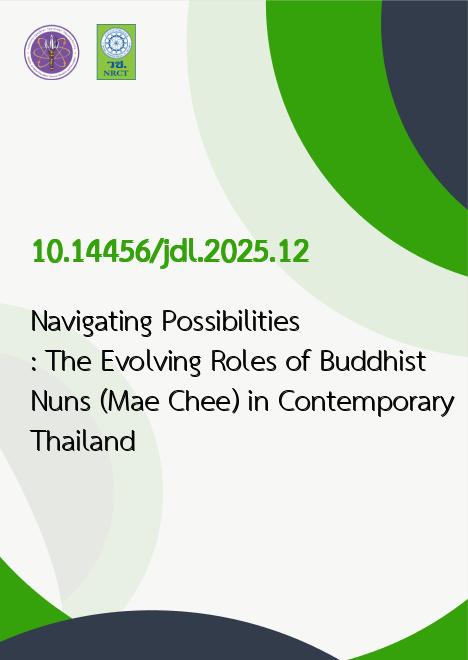
|
Navigating Possibilities: The Evolving Roles of Buddhist Nuns (Mae Chee) in Contemporary Thailand |
|---|---|
| รหัสดีโอไอ | |
| Creator | Metteyya Beliatte |
| Title | Navigating Possibilities: The Evolving Roles of Buddhist Nuns (Mae Chee) in Contemporary Thailand |
| Publisher | Buddhist Studies Foundation Wat Buranasiri Matayaram |
| Publication Year | 2568 |
| Journal Title | Journal of Dhamma for Life |
| Journal Vol. | 31 |
| Journal No. | 2 |
| Page no. | 166-186 |
| Keyword | Gender Equality, Women Empowerment, Mae Chees, Thai Female Monasticism, Thai Nuns, Theravada Buddhism, Thai Buddhist Nunneries, Thai Buddhism, Religious Feminism, Sustainable Development. |
| URL Website | https://so08.tci-thaijo.org/index.php/dhammalife |
| Website title | https://so08.tci-thaijo.org/index.php/dhammalife/article/view/4904 |
| ISSN | 2822-048X |
| Abstract | The changing roles of Buddhist nuns (Mae Chee) in Thailand reflect a significant shift in gender dynamics, religious authority, and societal engagement within the Theravāda Buddhist tradition. Despite increased participation in education, social services, and digital Dharma dissemination, Mae Chee continue to face institutional marginalization, economic instability, and cultural bias. This study investigates how contemporary Mae Chee navigate these challenges amid broader transformations influenced by modernization and global gender equality discourses. Using a qualitative approach, the research draws on semi-structured interviews with 45 nuns across diverse settings, including temples, independent nunneries, and those with advanced education, as well as non-participant observation. Thematic analysis revealed nuanced strategies by which Mae Chee assert agency, seek recognition, and contribute to their communities, despite limited institutional support. Findings indicate that although Mae Chee have made significant strides, particularly in education and community service, their formal recognition remains inadequate. All groups of nuns interviewed acknowledged a limited social role, with only a few exceptions involved in impactful initiatives like orphan care. The study highlights three urgent reforms: formal recognition of Mae Chee’s religious status, sustainable financial support, and intergenerational dialogue to bridge tradition and innovation. |